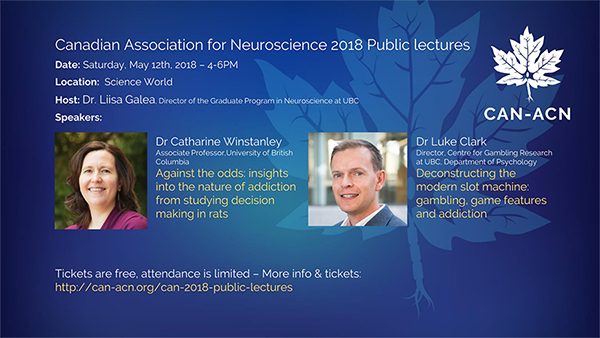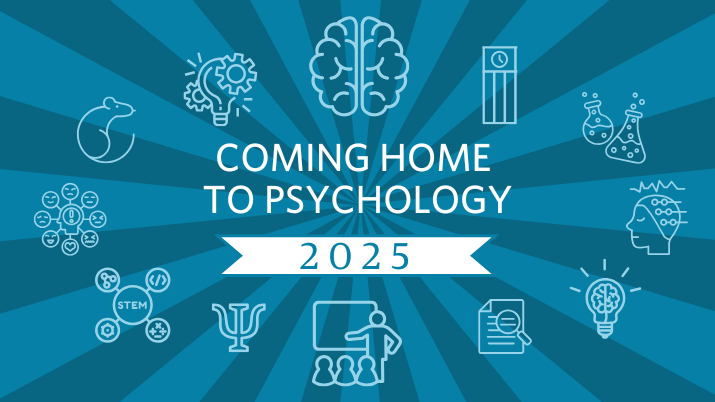The Canadian Association for Neuroscience is proud to announce the 2018 Public lectures will feature two leading Canadian experts on the topic of addiction.


Luke Clark and Catharine Winstanley
Dr. Catharine Winstanley, Associate Professor, UBC Psychology
If we knew why some individuals are catastrophically affected by addictions, whereas others are simply able to enjoy addictive drugs recreationally, we would be able to design effective treatments to help vulnerable individuals. Whether someone is dependent on a chemical substance like cocaine, or has developed a behavioural addiction such as gambling disorder, the maladaptive choice to pursue the addiction at the expense of other goals lies at the heart of the problem. Indeed, individuals with an addiction disorder, or who later develop problems with addiction, score poorly on laboratory-based decision-making tests that involve the weighing of costs and benefits. One hypothesis is that decision-making impairments may be compounded as the addiction develops because of the way in which addictive drugs, and also engagement in addictive behaviours, affect brain function, biasing the decision-making process in favour of the addiction. Choosing to abstain from the addictive substance or behaviour then becomes increasingly difficult. We have successfully developed an animal model of this kind of cost/benefit decision making: the rat Gambling Task (rGT). On both human and animal tests, subjects choose between four different options, each of which is associated with different amounts of potential reward and loss. By avoiding high-risk, high-reward options, subjects can maximise gains. Most rats develop this optimal strategy, although some animals instead favour the risky options. These risk-preferring rats are uniquely and adversely affected by taking cocaine: their decision making gets worse and they show increased drug-seeking in withdrawal indicative of greater relapse risk. Making risky choices therefore appears to be associated with greater sensitivity to the negative effects of an addictive drug. Furthermore, adding the kind of sensory feedback common to modern slot machines increases risky choice.
Dr. Catharine Winstanley investigates the brain mechanisms involved in impulse control. Defects in higher-order cognitive functions such as impulse control are involved in gambling and substance abuse problems. Dr. Winstanley’s research has also shown that traumatic brain injury and Parkinson’s disease can also result in cognitive dysfunction.
By using a multidisciplinary approach combining molecular biology techniques with pharmacological approaches and behavioral testing, the Winstanley laboratory has uncovered some of the factors and mechanisms underlying impulse control.
Learn more about her research on Dr. Winstanley’s Laboratory of Molecular and Behavioural Neuroscience website
Dr. Luke Clark, Associate Professor, UBC Psychology; Director, Centre for Gambling Research at UBC
Gambling is a widespread form of entertainment in Canada and across much of the world, with 73% of the BC population reporting gambling in the past year. For some people, gambling behaviour becomes excessive, and Gambling Disorder is a recognized mental illness that is now classified alongside the substance addictions in psychiatry, as the prototype ‘behavioural addiction’. Surprisingly, there is not yet a strong scientific foundation for how gambling (and other behaviours such as video gaming) can become ‘addictive’ in ways that are comparable to drugs of abuse. This talk will focus on research from psychology and neuroscience, considering how problem gambling develops. Part of the answer lies in personal vulnerability factors that cut across addictive disorders, including impulsivity as a personality trait and changes in the brain dopamine system. But personal vulnerabilities are not the full story: gambling products also play a role in the development of gambling problems, such that some forms of gambling are more harmful than others. Much of our research focuses on modern slot machines as a more harmful form of gambling. These games contain an array of psychological ingredients including near-misses and sensory feedback, which appear to amplify reward-related brain activity, especially in vulnerable individuals. Together, these features create a state of immersion that is also predictive of gambling problems.
Dr. Luke Clark is a global expert on the psychology of gambling. Dr. Clark’s research is directed at understanding the neural and psychological basis of distorted styles of thinking during gambling, and the relevance of these processes to problem gambling. This work combines measurement of brain activity and psychophysiology during cognitive tasks with other approaches including investigation of patients with focal brain injury, and pharmacological studies in healthy volunteers. Dr. Clark is the Director of the Centre for Gambling Research at UBC. The goal of the Centre for Gambling Research at UBC is to reduce the harms associated with problem gambling through the scientific study of the psychology and the neuroscience of gambling games and problem gamblers, ultimately improving evidence-based gambling policy.
MORE




